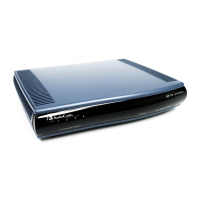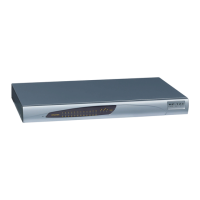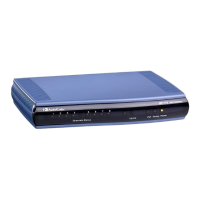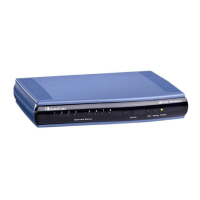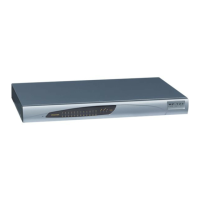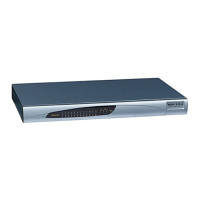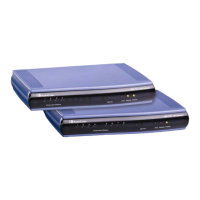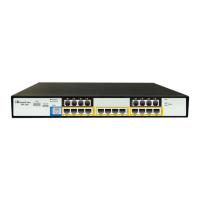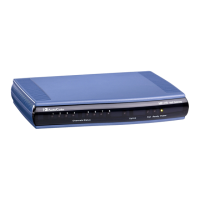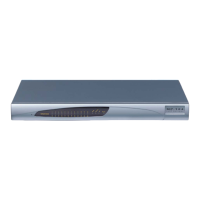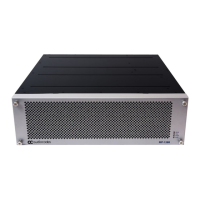MediaPack SIP
MediaPack SIP User’s Manual 64 Document #: LTRT-65405
Table 5-4: DTMF & Dialing Parameters (continues on pages 63 to 65)
Parameter Description
Use Out-of-Band DTMF
[IsDTMFUsed]
Use out-of-band signaling to relay DTMF digits.
No [0] = DTMF digits are sent in-band (default).
Yes [1] = DTMF digits are sent out-of-band according to the parameter ‘Out-of-band
DTMF format’.
Note: When out-of-band DTMF transfer is used, the parameter ‘DTMF Transport Type’
is automatically set to 0 (erase the DTMF digits from the RTP stream).
Out-of-Band DTMF Format
[OutOfBandDTMFFormat]
The exact method to send out-of-band DTMF digits.
INFO (Nortel) [1] = Sends DTMF digits according with IETF <draft-choudhuri-sip-
info-digit-00>.
INFO (Cisco) [2] = Sends DTMF digits according with Cisco format (default).
NOTIFY (3Com) [3] = NOTIFY format <draft-mahy-sipping-signaled-digits-01.txt>.
Note 1: To use out-of-band DTMF, set ‘IsDTMFUsed=1’.
Note 2: When using out-of-band DTMF, the ‘DTMFTransportType’ parameter is
automatically set to 0, to erase the DTMF digits from the RTP stream.
Declare RFC 2833 in SDP
[RxDTMFOption]
Defines the supported Receive DTMF negotiation method.
No [0] = Don’t declare RFC 2833 Telephony-event parameter in SDP
Yes [3] = Declare RFC 2833 Telephony-event parameter in SDP (default)
The MediaPack is designed to always be receptive to RFC 2833 DTMF relay packets.
Therefore, it is always correct to include the ‘Telephony-event’ parameter as a default in
the SDP. However some gateways use the absence of the ‘telephony-event’ from the
SDP to decide to send DTMF digits in-band using G.711 coder, if this is the case you
can set ‘RxDTMFOption=0’.
DTMF RFC 2833 Negotiation
[TxDTMFOption]
Disable [0] = No negotiation, DTMF digit is sent according to the parameters ‘DTMF
Transport Type’ and ‘RFC2833PayloadType’ (default).
Enable [4] = Enable RFC 2833 payload type (PT) negotiation.
Note 1: This parameter is applicable only if ‘IsDTMFUsed=0’ (out-of-band DTMF is not
used).
Note 2: If enabled, the gateway:
• Negotiates RFC 2833 payload type using local and remote SDPs.
• Sends DTMF packets using RFC 2833 PT according to the PT in the received SDP.
• Expects to receive RFC 2833 packets with the same PT as configured by the
‘RFC2833PayloadType’ parameter.
Note 3: If the remote party doesn’t include the RFC 2833 DTMF relay payload type in
the SDP, the gateway uses the same PT for send and for receive.
Note 4: If TxDTMFOption is set to 0, the RFC 2833 payload type is set according to the
parameter ‘RFC2833PayloadType’ for both transmit and receive.
RFC 2833 Payload Type
[RFC2833PayloadType]
The RFC 2833 DTMF relay dynamic payload type.
Range: 96 to 99, 106 to 127; Default = 96
The 100, 102 to 105 range is allocated for proprietary usage.
Note 1: Cisco is using payload type 101 for RFC 2833.
Note 2: When RFC 2833 payload type (PT) negotiation is used (TxDTMFOption=4), this
payload type is used for the received DTMF packets. If negotiation isn’t used, this
payload type is used for receive and for transmit.
Use INFO for Hook-Flash
[IsHookFlashUsed]
No [0] = INFO message isn’t sent (default).
Yes [1] = Proprietary INFO message with hook-flash is sent when hook-flash is detected
(FXS). FXO gateways generate a hook-flash signal when INFO message with hook-
flash is received.
Note: When either of the supplementary services (Hold, Transfer or Call Waiting) is
enabled, hook-flash is used internally, and thus the hook-flash signal isn’t sent via an
INFO message.

